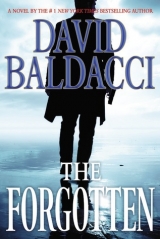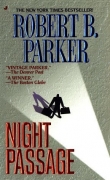
Текст книги "The Forgotten"
Автор книги: David Baldacci
Жанры:
Политические детективы
,сообщить о нарушении
Текущая страница: 4 (всего у книги 28 страниц)
CHAPTER

10
“FREEZE!”
The order came from the woman.
Puller obeyed the command.
“Hands over your head,” added her partner.
“Do you want me to freeze or put my hands over my head?” asked Puller. “Because I can’t do both. And I’m not looking to get shot over a misunderstanding.”
The two cops moved closer, one to his right, one to his left.
Puller noted that the woman watched his hands, while the guy was glued to his eyes. The woman was right. Puller couldn’t kill with his eyes. But his hand could pull a weapon and open fire within a second without his eyes moving an inch.
She said, “Put your hands over your head, fingers interlocked. Then down on your stomach, legs spread, facedown.”
“I have an M11 in a rear belt holster. And my Army creds and badge are inside my front pants pocket.”
The two cops made the mistake of glancing at each other. Puller could have shot them both dead in the two seconds they took to do that. But he didn’t and so they would get to live another day.
“What the hell is an M11?” asked the male officer.
Before Puller could answer the woman said, “Army’s version of the Sig P228.”
Puller eyed her with interest. She was about five-seven, with blonde hair pinned up tight with a clamp at the back. Her build was slender, compact, but she moved with a dancer’s grace and her hands looked strong.
He said, “If I could reach very slowly in my front pants pocket I’ll show you my creds and badge.”
This time the woman didn’t look at her partner. “What unit?”
“The 701st out of Quantico, Virginia,” he answered promptly.
“CID or MP?” she asked.
“CID. I’m a CWO.”
Before her partner could ask she translated: “Chief warrant officer.”
Puller looked at her curiously. “You former military?”
“My brother.”
Puller said, “Can I get my pack out?”
“Do it really slowly,” said the guy, tightening the grip on his gun.
Puller knew that was the exact wrong thing to do. An overly tight grip meant you would increase your error rate about thirty percent or more. But he was more concerned that the guy would mess up and accidentally shoot him.
“Two fingers in the pocket, that’s all,” said the woman. “And keep your other hand on the top of your head.” Her voice was firm, direct, even. He liked that. Her nerves were definitely not running away with her senses, unlike her partner.
Puller two-fingered out his cred pack and held it up, ID card first, badge second. The CID’s one-eyed eagle symbol was unique.
The two drew close enough for Puller to simply hand the pack to the woman while the man kept his drawdown on him. He actually wished it had been the other way around, because the guy looked wound tight enough to shoot all three of them dead.
She lifted her gaze from the cred pack, checking the photo on there with the man himself, and said, “Okay, but I’m going to have to take your sidearm as a precaution until we sort this out.”
“Small of my back, belt holster.”
She moved behind him while her partner took a step back and lined Puller up in his iron sights.
She gave him a quick but efficient patdown, her hands flitting over his backside, then down and up the insides of his legs. Puller felt his shirt being lifted up. Then she slid the pistol out of the holster and a moment later she stood in front of him, gripping his pistol by the muzzle and pointing it downward.
She said, “We got a call about a break-in. What are you doing here?”
“This is my aunt Betsy Simon’s place. I came down here to pay her a visit. No one answered the door, so I went in through the back.”
“Long way to come, from Virginia,” said the man, with his gun still aimed at Puller’s head.
Puller didn’t look at him but spoke to the woman. “Can you ask your partner to holster? Accidents can happen.”
“The cred pack’s legit, Barry, and he’s unarmed now. You can stand down.”
“John Puller,” said the woman. “And your aunt was Betsy Simon?”
He nodded. “And you are?” He had glanced at her nametag, but the sun’s glare made it impossible to read.
“Officer Landry, Cheryl Landry. That’s Officer Barry Hooper.”
She handed him back his cred pack.
“Any idea where my aunt is?” asked Puller.
Landry looked at her partner nervously.
Puller caught the look. “I saw some interesting things in the backyard. Did something happen back there?”
“Why do you think that?” she asked suspiciously.
“Clues around the fountain. And I saw tracks in the grass back there where a gurney had been wheeled in and out. I’m assuming that gurney was carrying someone. Was that someone my aunt?”
“We were first responders,” said Landry quietly.
“To what exactly?”
“The lady who lived here drowned in the little pool back there,” interjected Hooper.
His partner shot him a reproachful glance and said, “It seemed to be an accident. I’m sorry, Agent Puller.”
Puller stood there trying to take it all in. In a way, he was not surprised. In another way he was flummoxed. He had been hoping that the victim was someone other than his aunt.
He asked, “Can you walk me through what happened?”
Hooper snapped, “We’re responding to a B and E right now and you’re it. We’re not standing here jawing with you. We should be cuffing you and reading you your rights.”
Landry looked at him. “He’s right. We don’t know if your aunt was Betsy Simon. And we don’t know what you were doing in her house.”
“Photo in my shirt pocket. I took it from the house.”
Landry slid the photo out, looked at it.
“It’s quite a few years old, but if you saw my aunt I don’t think she’s changed that much. And I look pretty much the same, with a few more lines. And our names are listed on the back.”
Landry studied the picture and the reverse side and then let Hooper look at it.
“It’s him, Barry,” said Landry.
“Still not conclusive to me,” retorted Hooper.
Puller shrugged and took the photo back. “Okay, so let’s go down to the station and straighten it out. I was heading there anyway after I finished looking around here.”
“Like I said, the lady fell and drowned in her little pool,” said Hooper. “Accident all the way.”
“Medical examiner confirm that?”
Landry said, “Haven’t heard. Autopsy should be done by now.”
Hooper said, “It was an accident. Lady fell and drowned. We checked the scene out thoroughly.”
“Yeah, that’s what you keep saying. What, are you trying to convince yourself it’s true?”
Landry added, “That’s what it looked like all right, Agent Puller. I can understand it’s hard to accept a tragedy like that, but it happens. Especially with older folks.”
“And Florida has more than most,” added Hooper. “Dropping like flies every minute of every day.”
Puller turned to look at him and took a step closer to the man to accentuate their differences in vertical prominence. “Except they’re not.”
“Not what?” said Hooper, looked confused.
“Flies. And in case you didn’t know, autopsies reveal about twenty-five percent of the time a different cause of death than the one everybody thought it was.”
“We can go down to the station,” said Landry in a placating tone. “And straighten things out, like you said.”
“You want me to follow you or go in your car?” asked Puller.
“It’s not a choice. You go in our ride,” said Hooper, before Landry could speak. “With your hands cuffed and your rights read.”
“You’re really going to arrest me?” asked Puller.
“Did you break into that house?” Hooper shot back.
“I went in to check on my aunt.”
“Why didn’t you call the police if you were concerned?” asked Landry. “We could have filled you in.”
“Maybe I could have, but it’s not my way of doing things,” replied Puller.
“Army have the luxury of letting its guys just bop around the country doing their own stuff?” said Hooper. “No wonder our taxes are so damn high.”
“Even the Army lets its guys have some R and R time, Officer Hooper.”
“We’ll leave your car here,” broke in Landry. “You ride with us, but without the cuffs or the rights read.”
“Thanks,” said Puller, as Hooper eyed his partner darkly.
“But if your story doesn’t check out,” she warned, “that all changes.”
“Fair enough,” said Puller. “But after you find out I’m legit, I’ll need to see my aunt’s body.”
He walked toward their cruiser. “Let’s roll,” he called back over his shoulder.
The two cops slowly followed.
CHAPTER

11
THE PARADISE POLICE STATION WAS located two blocks off the beach in a two-story stone and stucco structure that had an orange terra-cotta roof and a pair of palm trees out front. It sat next to a Ritz-Carlton hotel and looked more like a country club than a place where cops went to get their patrol assignments and cruisers to go hunt criminals.
As Puller climbed out of the police car and looked around he said to Hooper, “Did you purposely locate in the high-crime area to keep watch over the criminal element?”
Hooper ignored him, but placed an arm on Puller’s elbow to shepherd him into the building. Apparently Hooper was under the impression that Puller was in custody and the only things missing were the cuffs over his wrists and a Miranda warning ringing in his ears.
The place inside looked much like the place outside. High-dollar, clean, orderly. In fact it was the cleanest, most orderly police station Puller had ever seen. The personnel working inside pristinely delineated office spaces barely looked up as the trio came in. Their clothes were starched, spotless, and looked to have been fitted by a veteran tailor. No phones were ringing. No one was screaming for his lawyer or declaring that he was innocent of all trumped-up charges. No uncooperative prisoners were puking on the floor. No fat, sweaty cops with major B.O. and pissed-off attitudes were waddling down the halls in search of a myocardial infarction in the form of a vending machine stuffed with chocolate and sodium.
It was such a total disconnect for Puller that he looked around for a camera, seriously wondering for a few moments whether he was being punked.
He glanced at Landry, who was walking next to him. “I’ve never seen a police station quite like this one.”
“What’s so different about it?” she asked.
“You been in any others?”
“A few.”
“Trust me, it’s different. I was looking around for a valet outside and a place to order a drink in here before I teed off for a quick round of nine holes. And I don’t even play golf.”
Hooper nudged his elbow harder. “So we’ve got a strong tax base. That’s a problem somehow?”
“Didn’t say it was a problem. Just said it was different.”
“Then maybe everybody else should follow our example,” retorted Hooper. “Because I think we’ve got it right. Money equals a better life all around.”
“Yeah, next time I’m in Kabul, I’ll let them know your thoughts.”
“I was talking the United States of America, not dipshit land where they talk funny and think their pissant god is better than our real God.”
“I think I’ll keep that one to myself,” replied Puller.
“Like I give a crap what you do.”
Puller tried to remove his elbow from Hooper’s grip but the man kept it there, as if he were a magnet and Puller were a block of metal. The guy was doing it just to piss him off. That was clear. And Puller could do nothing about it unless he wanted to end up in a jail cell, which would seriously crimp the investigation of his aunt’s death.
Hooper directed him to a chair outside of a frosted glass–enclosed office with the name Henry Bullock, Chief of Police stenciled on the door. Landry knocked twice and Puller heard a gruff voice say, “Enter.”
Hooper stood next to him as Landry disappeared inside the office.
Puller had nothing else to do so he looked around. His attention was captured by a man and a woman in their early forties because they appeared distraught in a sea of otherwise complete calm. They were seated at the desk of a man dressed in black slacks, white-collared shirt with the sleeves rolled to the elbows, and a muted tie. A plastic lanyard with a badge on it hung from his reedy neck.
Puller could catch only snatches of the conversation, but he heard the words “late-night walk,” then the names “Nancy and Fred Storrow.”
The woman dabbed at her nose with a tissue while the man looked down at his hands. The guy behind the desk hit keys on his computer and uttered sympathetic noises.
Puller drew his attention away from this exchange when the door to Bullock’s office opened and Landry and another man whom Puller assumed was the chief of police stepped out.
Henry Bullock was a fraction under six feet with thick shoulders and hammy arms that pulled tight against his regulation uniform. His gut was widening and offered even greater strain against the fabric than did his muscles. His body was better balanced than Hooper’s because the man’s legs were thick but tapered down to unusually small feet. He looked to be in his late fifties, with thinning gray hair, thick eyebrows, a bulbous nose, and skin that had seen too much sun and wind. The furrows on his brow were deep and permanent and left him with a perpetual scowl.
If he’d been in a different uniform Puller would have sworn the man was his former drill sergeant.
“Puller?” he said, staring down at him.
“That’s me.”
“Come on in. You too, Landry. Hoop, you can wait outside.”
“But Chief,” said Hooper. “I was in on the bust too.”
Bullock turned to look at him. “There is no bust, Hoop. Not yet. If there is, I’ll let you know.”
And in those few words Puller could tell that Bullock was a savvy man and knew exactly the limits of Officer Hooper.
Hooper stood there sullenly, his gaze on Puller as though this slight was somehow his fault. Puller stood and walked past the man, his elbow finally free.
“Just hang tight, Hoop,” he said. “We’ll get back to you.”
CHAPTER

12
PULLER WALKED INTO THE OFFICE, trailed by Landry. She shut the door behind her.
The office was a twelve-foot-wide, eight-foot-deep rectangle of space. It was furnished in a spartan, no-nonsense way, which, Puller assumed, precisely paralleled the personality of the occupant.
Bullock sat down behind his wooden desk and motioned for Puller to take the lone chair opposite. Landry stood at semi-attention diagonally off Puller’s left shoulder.
Puller sat, looking expectantly at Bullock.
The police chief fiddled with the fingernail of his right index finger for a few moments before breaking the silence.
“We’re verifying you are who you say you are.”
“And after you do can I check out the crime scene?”
Bullock flicked an annoyed gaze at him. “There is no crime scene.”
“Technically, maybe not, but that could change.”
“Your aunt was how old?”
“Eighty-six.”
“And used a walker, the report said. She fell, hit her head, and drowned. I’m very sorry it happened. Lost my grandmother to a drowning accident. Had a seizure in the bathtub. She was old too. It just happened. Nothing anyone could do. Looks to be the same here. You shouldn’t feel guilty about it,” he added.
“Has it been confirmed that she drowned?” asked Puller, ignoring this last barb.
When neither of them said anything, he said, “Unless Florida is really different, there has to be something written on the death certificate in the ‘cause of death’ box or people get a little nervous.”
“Water in the lungs, so yes, she drowned,” said Bullock. “Medical examiner completed the autopsy last night. Technically I believe the term is—”
Puller finished for him, “Yeah, asphyxiation. Can I see the report?”
“No, you can’t. They don’t go out to anyone except next of kin and those with a court order.”
“I’m her nephew.”
“So you say, but even so, I’ve always interpreted the definition of next of kin to be immediate family.”
“She doesn’t have any. Her husband’s dead, and her only sibling is back in Virginia at a VA hospital and lacks the mental capacity to handle this. And she had no kids.”
“I’m sorry. There’s really nothing I can do about that,” said Bullock. “The privacy of the deceased is not something I take lightly.”
“But you do take lightly that someone might have murdered her?”
Bullock snapped, “I don’t care for what you’re insinuating.”
“Weren’t you going to contact her next of kin?” Puller asked.
“We were in the process of doing that. We did a preliminary search of her home, but didn’t find any helpful info. And you have to understand, this is Florida. Lots of elderly, lots of deaths. We have four others we’re running down next of kin on and I have limited manpower.”
“The ME listing drowning as the cause of death tells us what killed her. It doesn’t tell us how she got in the water in the first place.”
“She fell.”
“That’s a guess, not a fact.”
Landry stirred, seemingly about to say something, but then apparently thought better of it and remained silent.
Puller noticed this but didn’t react. He figured he could have a chat with her later, outside the presence of her boss.
“It’s an educated, professional assumption based on the facts on the ground,” corrected Bullock.
“An educated assumption is really just a guess in sheep’s clothing. The real reason I’m down here is because of a letter she sent.” He pulled it from his pocket and handed it to Bullock. Landry moved around and read it over her supervisor’s shoulder.
Bullock finished reading, folded the letter, and handed it back. “Proves nothing. If I had a dollar for every time some old woman thought something weird was going on, I’d retire a rich man.”
“Really? That would take like over a million old crazy ladies, wouldn’t it? The population of Paradise is 11,457. I checked before coming down. You’re going to have to recruit a lot more old crazy ladies if you want to retire.”
Before Bullock could respond to this a fax machine on a credenza behind him zinged to life. A paper came down the chute. Bullock picked it up, alternated reading it and gazing at Puller.
“Okay, you are who you say you are.”
“Nice to have it confirmed.”
“Landry here tells me you’re Army CID.”
“That’s right. About six years. Before that I was in the ranks carrying a rifle.”
“Well, I’ve been chief of police of this little hamlet for fifteen, and fifteen years before that I was a cop pounding the streets. Saw my share of murders and accidents. This is the latter, not the former.”
“Am I missing something here?” asked Puller. “Is there some reason you don’t want to check this out more thoroughly? If it’s a question of manpower I’m here to volunteer my services. And I’ve been around a lot of accidents and murders too. The Army unfortunately has an abundance of both. And I’ve handled cases that started out looking like an accident that turned into something else and vice versa.”
“Well, maybe you’re just not as good as we are,” shot back Bullock.
“Maybe I’m not. But why don’t we find out for sure? We have a little question of justice to be answered.”
Bullock rubbed his face with his hand like he was working off some fine grit, and shook his head.
“Okay, I think we’re done here. I’m sorry for your loss, if she is your aunt. But I would not advise going near her property again unless you have appropriate authorization. Next time we will arrest you.”
“And how exactly do I get authorization?”
“Talk to her lawyer. Maybe he can help. Probably just charge you a few thousand dollars.”
“I don’t know who her lawyer is. Maybe if I could go back to her house and check?”
“What part of appropriate authorization don’t you get?” said Bullock.
“So it’s a chicken and egg problem?”
“Hell, she’s your family, or so you say.”
Puller slipped out the picture. “I’ve got this.”
Bullock waved his hand dismissively. “Yeah, yeah, Landry told me about that. It’s not conclusive proof of anything.”
“So that’s it? That’s all you’ll do?”
“What I’m doing is my job. To serve and protect.”
“Well, if Betsy Simon was killed, you didn’t do a really good job on either one, did you?”
Bullock rose and stared down at Puller. For an instant Puller thought the man was going to pull his gun, but he simply said, “You have a good day, Mr. Puller.” He nodded at Landry, who said, “You can follow me out, Agent Puller.”
After the door closed behind them Hooper was next to Puller in an instant, his hand on his elbow again, like a sheepdog to a sheep. Only Puller would never be classified as a sheep. He firmly removed Hooper’s hand from his elbow and said, “Thanks. But unlike my aunt, I can walk unaided.”
Before Hooper could say anything Puller walked off, retracing his steps from the way in. Landry fell in behind him.
“I need my gun back,” said Puller.
“It’s in the police cruiser. We can drop you off at your car.”
“Thanks, I’d rather walk,” said Puller.
“It’s a long walk.”
Puller turned to look at her. “I have a lot to think about. And I’ve never been in Paradise before. I’d like to see every inch of it. Might never get another chance. Most folks who know me have me down for heading to the other place.”
At this Landry cracked a smile.
They reached the cruiser and Landry handed him back his M11 as Hooper hovered in the background, still looking upset that Puller wasn’t behind bars.
Landry handed Puller a card. “If you need any help,” she said, her gaze searching his for an instant before looking away. “Personal cell phone number’s on the back.”
Puller slid his M11 into the belt holster and her card into his shirt pocket.
“Appreciate that. Might take you up on it, Officer Landry.”
He glanced over her shoulder at Hooper. “He always so friendly?”
“He’s a good cop,” she said in a low voice.
“Never said he wasn’t. But tell him to lay off the elbow intimidation thing. Gets old after about thirty seconds.”
She edged closer. “Try Bailey’s Funeral Home. It’s over off Atlantic Avenue. Where the ME does her work. We don’t have a formal medical examiner’s office in Paradise. She’s a doctor in practice who helps us out.”
“Thanks.”
He turned and strode off.
Hooper called after him, “Next time you won’t get off so easy.”
Puller just kept walking.








